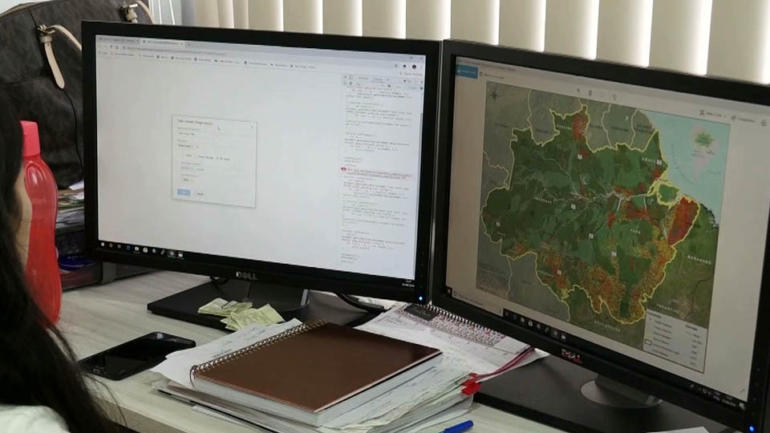Environmentalists in Brazil are sounding alarm bells.
Records show a surge in deforestation of the Amazon rainforest since President Jair Bolsonaro took office in January.
Now there’s concern that Bolsonaro’s pro-business, pro-farming policies will hasten destruction of an already shrinking bio-diverse land.
CGTN’s Paulo Cabral visited the state of Para to investigate.
The debate here is never-ending How much of the Amazon Jungle is worth protecting from deforestation And how much should be open to profitable pursuits like farming, cattle ranching and logging The arguments often turn heated and tense.
Under Jair Bolsonaro’s government, farmers and loggers seem to have the upper hand, with deforestation on the rise.
At Imazon – an independent monitoring organization based in the Amazon state of Para – that can be seen on the screens that keep track. Researchers here study deforestation rates and pass on alerts to public and private partners when destruction is detected.The group says deforestation has actually been growing in the region since 2012 – but the curve got steeper in the first few months of this year.
“Already in the first few months of this new government we have noticed an increase in the rate of deforestation,” Heron Martin, a researcher in Imazon, said. “Some measures like the reduction of resources for monitoring and control did reflect in the increase in deforestation.”
In Brazil, both private and public groups said they have radar and satellite imagery technology to remotely monitor deforestation in the Amazon. But after authorities are alerted to illegal activity – the challenge is to get the teams on the ground in time to stop the destruction and not only witness it.
A team in the city of Brasil Novo – in the heart of the Amazon – has recently received notice of a deforested area picked on satellite imagery.
In the marked location, the jungle has been burned and cut to give way to cattle ranching. Farmers are now clearing the remaining vegetation. They may be fined and ordered to replant part of the area – but the old-growth jungle is gone for good.
The mayor of Brasil Novo, Alexandre Lunelli – of the opposition Workers Party – fears the dismantling of federal controls and monitoring operations.
“There’s a debate going in Brazil about the reduction of resources for environmental surveillance and control,” Lunelli said. “I am not sure if the government will have the strength to carry on with this but there is increasing deforestation pressure for logging and pastures.”
Amazon cattle ranchers are optimistic and hope the new government will make good on its promise to help expand production.
Saulo de Tarso is one such Cattle Rancher. “If the population stops growing then stopping deforestation would be possible. But it won’t happen. How can we stop if the world population is growing and everybody needs food That’s why I don’t believe in this idea of zero deforestation.”
The hardwood industry is also hoping for a better business environment – with a friendly government in power.
“When government agents come here, they treat us like criminals,” Antonio Jose, a sawmill owner in the area said. “They want to humiliate people. But I did notice that things are improving and we hope Bolsonaro will fulfill at least part of his promises.”
There’s worldwide concern over the fate of the Amazon under Brazil’s right-wing – and pro-farming – government. The spike in deforestation this year may be just the first sign of government policy shifts that could change the jungle landscape forever.
 CGTN America
CGTN America

